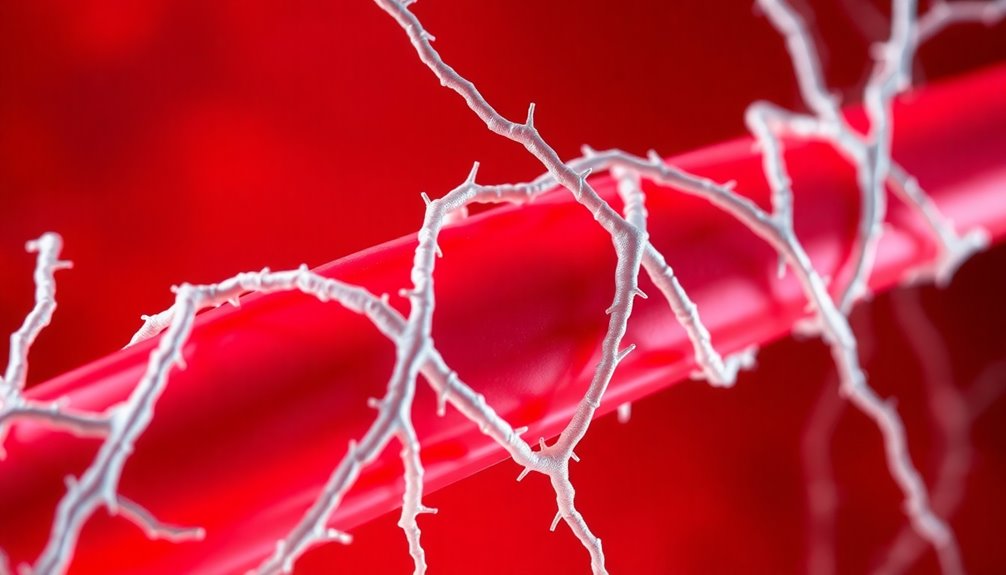Collagen Type VIII is essential for your blood vessel health as it influences vessel integrity, extracellular matrix development, and smooth muscle behavior. Its deficiency can lead to lower blood pressure, increased arterial compliance, and impact elastin synthesis. Type VIII collagen plays a pivotal role in orchestrating ECM remodeling, cell growth, and tissue stiffness, all necessary for maintaining healthy blood vessels. Understanding these mechanisms is crucial for developing targeted therapies and preventing complications associated with conditions like atherosclerosis. By exploring how Collagen Type VIII influences blood vessel health, you can uncover its vital role in maintaining the integrity and function of your vascular system.
Key Takeaways
- Collagen Type VIII influences vessel integrity and ECM development.
- Deficiency leads to reduced blood pressure and increased arterial compliance.
- It modulates smooth muscle cell behavior and tissue stiffness.
- Interacts with integrins, DDR1, and influences MAPK signaling.
- Plays a role in ECM remodeling, cell migration, and MMP2 production.
Role in Vascular Diseases
Being upregulated in aged and diseased vessels, Collagen VIII plays an essential role in impacting vessel integrity and extracellular matrix development. In vascular diseases, VIII collagen is implicated in vascular remodeling, influencing smooth muscle cell behavior and extracellular matrix composition. Its deficiency leads to reduced blood pressure and increased arterial compliance, highlighting its importance in maintaining vascular health.
Collagen VIII influences elastin synthesis and deposition, affecting arterial elasticity and vessel flexibility. Knockout studies have shown that the absence of collagen VIII enhances elastin synthesis in arteries, potentially improving vessel flexibility and compliance.
The interplay between Collagen VIII and elastin in smooth muscle cells suggests a complex relationship that could have significant implications for understanding and treating vascular diseases. By modulating these factors, researchers may uncover new therapeutic approaches to enhance arterial function and combat the progression of vascular disorders.
Downstream Signaling Mechanisms
In the domain of blood vessel health, understanding Collagen Type VIII goes beyond its structural contribution and extends into the sphere of downstream signaling mechanisms. Collagen VIII acts as a critical ligand for β-integrins and DDR1, playing a key role in smooth muscle cell migration essential for vascular remodeling. Through DDR1-mediated MAPK signaling, collagen VIII deficiency hinders mesangial cell proliferation, impacting vascular stability.
The interaction of collagen VIII with integrins not only influences cell behavior but also promotes MMP2 production, contributing to tissue remodeling processes. Additionally, collagen VIII is involved in fibrosis regulation and tissue compliance, highlighting its significance in maintaining vascular health.
Knockdown of COL8A1 demonstrates proapoptotic effects on cancer cells, while exogenous COL8A1 supports cell survival by activating FAK. These signaling pathways underscore the intricate role of collagen VIII in vascular homeostasis, emphasizing its diverse impact on blood vessel function and health.
ECM Remodeling and Cell Growth
Amid the intricate web of extracellular matrix (ECM) dynamics, Collagen Type VIII emerges as a pivotal player in orchestrating ECM remodeling and regulating cell growth. Collagen VIII plays a vital role in vascular remodeling by facilitating smooth muscle cell migration and promoting MMP2 production in the extracellular matrix. Through interactions with integrins, Collagen VIII modulates cell behavior and activates survival pathways essential for cell growth.
Moreover, studies have shown that knockdown of COL8A1 can induce proapoptotic effects on cancer cells, while exogenous COL8A1 promotes cell survival by activating FAK. Collagen VIII deficiency not only reduces arterial compliance and increases tissue stiffness but also decreases fibrillar collagen synthesis, impacting overall tissue health.
Fibrosis and Tissue Compliance
Collagen Type VIII's role extends beyond ECM remodeling and cell growth to impact fibrosis and tissue compliance in a significant manner. In various conditions, collagen VIII contributes to tissue stiffness and fibrosis. Its absence results in reduced arterial wall compliance and increased tissue stiffness.
Collagen VIII plays an essential role in inhibiting elastin transcription in vascular smooth muscle cells. Additionally, it influences TGF-β1/SMAD3 signaling in mesangial cells. Importantly, the absence of collagen VIII leads to a reduction in the synthesis of fibrillar collagens I and III.
These mechanisms highlight the importance of collagen VIII in vascular remodeling and maintaining arterial wall compliance. Understanding the involvement of collagen VIII in fibrosis and tissue compliance sheds light on its substantial impact on overall blood vessel health, emphasizing the intricate interplay between collagen VIII and various processes essential for vascular function.
Materials and Methods
The study employed a model of arteriovenous fistula (AVF) creation in Col8a1/a2 null mice and wild type controls to investigate the role of collagen Type VIII in postoperative AVF remodeling and vascular inflammation. Intimal hyperplasia within AVF cross-sections was quantified using Masson's trichrome staining to evaluate vascular restructuring. Inflammation levels were assessed by quantifying infiltrated macrophages with anti-galectin 3 antibodies to understand the inflammatory response.
Comparing AVF sections from collagen VIII null mice to wild type controls revealed a reduction in intimal hyperplasia, indicating the potential influence of collagen Type VIII on this process. The absence of collagen VIII in mice greatly impacted postoperative AVF remodeling and vascular inflammation, suggesting an essential role in blood vessel health. These methods allowed for a thorough evaluation of the effects of collagen Type VIII on AVF remodeling and inflammation in Col8a1/a2 null mice and wild type controls.
Collagen Composition and Synthesis
During vascular injury and remodeling processes, the composition and synthesis of collagen play essential roles in maintaining tissue integrity and function. Collagen type VIII, composed of α1 and α2 chains in the vasculature, is normally present in minimal amounts in healthy arteries but markedly increases after injury.
In atherosclerotic lesions, there's an upregulation of type VIII collagen, which promotes smooth muscle cell proliferation. This collagen type serves as a haptotactic factor for smooth muscle cells, influencing their migration within the vessel walls.
Knockout studies have shown that smooth muscle cells lacking type VIII collagen exhibit reduced migration and proliferation abilities. However, the introduction of exogenous type VIII collagen can rescue these cellular functions.
The synthesis of type VIII collagen is vital for maintaining vascular health and supporting the proper functioning of smooth muscle cells during processes such as wound healing and tissue repair. Understanding the role of collagen composition and synthesis is crucial for comprehending the intricate mechanisms involved in blood vessel health.
Functional Role
In the context of blood vessel health, understanding the functional role of collagen type VIII becomes essential. Type VIII collagen serves as a provisional matrix that facilitates smooth muscle cell movement in response to arterial injury. Produced by macrophages and smooth muscle cells, it acts as a haptotactic factor, guiding smooth muscle cells towards the site of injury.
Studies have shown that knockout of type VIII collagen leads to reduced migration and proliferation in smooth muscle cells, highlighting its importance in these processes. Surprisingly, the addition of exogenous type VIII collagen can rescue the migration and proliferation deficits observed in knockout smooth muscle cells.
Moreover, the deficiency of type VIII collagen in ApoE-null mice results in impaired smooth muscle cell proliferation and migration, ultimately impacting the stability of atherosclerotic plaques. This intricate relationship underscores the significant role that collagen type VIII plays in maintaining blood vessel health and homeostasis.
Role of ApoE
An indispensable player in the domain of blood vessel health, ApoE stands out for its pivotal role in regulating lipoproteins' clearance from plasma. This function is vital as abnormalities in lipoprotein metabolism, due to ApoE dysfunction, are associated with the development of atherosclerosis.
Studies using ApoE-null mice have demonstrated the significance of ApoE in atherosclerosis progression and vascular remodeling processes.
Moreover, ApoE has shown to inhibit smooth muscle cell proliferation by upregulating nitric oxide, a key molecule involved in maintaining vascular homeostasis. Additionally, ApoE plays a role in suppressing the expression of type VIII collagen gene by smooth muscle cells.
This regulatory mechanism is crucial in preventing excessive collagen production, which can lead to vascular complications.
Related Studies
To gain a thorough understanding of the complex relationship between Collagen Type VIII and blood vessel health, researchers have conducted various studies utilizing both in vitro and in vivo models.
Expressions of type VIII collagen play a pivotal role in vascular matrix remodeling, impacting processes such as cell proliferation, smooth muscle cell migration, and atherosclerotic plaque development.
Studies have shown that β1 integrin signaling is involved in mediating the effects of type VIII collagen on smooth muscle cells, affecting their ability to migrate and contribute to fibrous cap formation in atherosclerosis.
Additionally, MMP-2 expression is influenced by type VIII collagen levels, further impacting endothelial cell function and atheroma stability.
Understanding the intricate mechanisms by which type VIII collagen influences vascular health is crucial for developing targeted therapies to improve blood vessel function and prevent complications associated with atherosclerosis.
Conclusion
To sum up, collagen type VIII plays a vital role in maintaining blood vessel health by influencing downstream signaling mechanisms, ECM remodeling, and cell growth. Its dysregulation has been linked to vascular diseases such as atherosclerosis and hypertension. Understanding the functional role of collagen type VIII and its interaction with other factors like ApoE can provide valuable insights for potential therapeutic interventions to improve vascular health.


